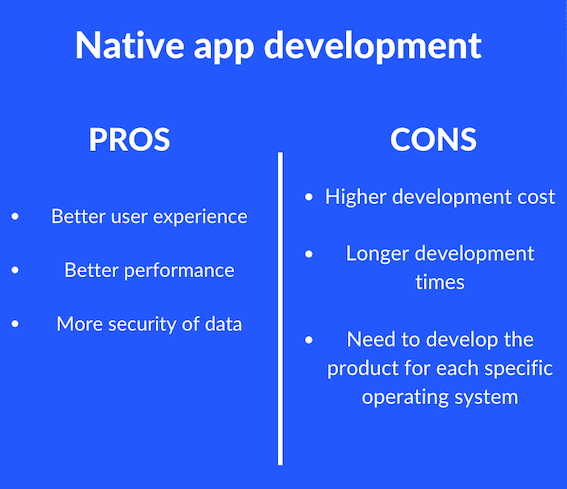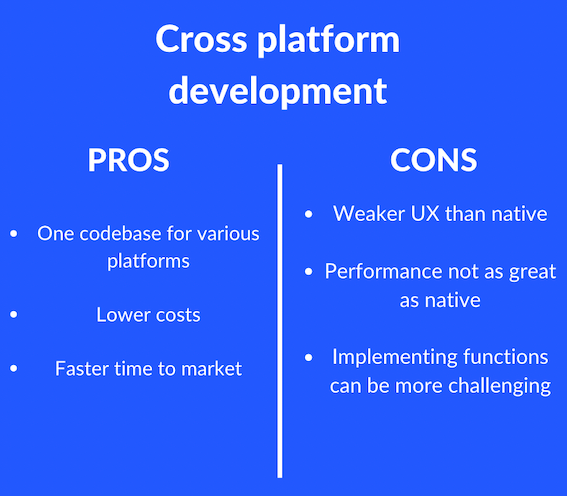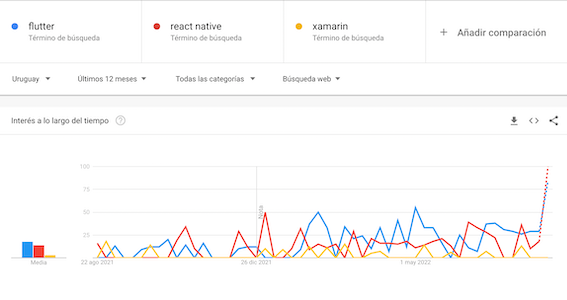Most companies typically want to have their mobile applications available on both the iOS and Android ecosystems, so when it comes to development the big debate is: native app development vs cross platform? It is difficult to say if one is better than the other without taking into account the client’s needs. It’s not a matter of which type of development is better but more so which one is more suited to your needs and priorities.
According to a study done by SensorTower, global application revenue climbed 15% year over year in Q3 of 2021 to nearly $34 billion. This includes in-app purchases, paid apps and subscriptions. With so much competition if you’re looking to launch a mobile application, one of the most important decisions you have to make is choosing between native vs cross platform mobile development. They each have their own pros and cons and choosing one or the other has long term implications in terms of cost, time, and functionalities.
In this post we go into detail about the following aspects of mobile app development:
- What is native app development
- What is cross platform development
- What the different cross platform frameworks are
- The differences between native app development vs cross platform
- The benefits each of these entail
- When to choose cross platform over native app development
What is native app development?
Native mobile app development refers to building a mobile application for a specific platform, this could be for iOS or Android for example. These applications are developed with programming languages and tools that are specific to that platform. For example, to develop an Android application you need to use either the programming language Java or Kotlin and for building iOS apps you need to use Objective-C or Swift. Native mobile applications, unlike actual websites or web apps, do not operate in the browser. They need to be downloaded from platform specific app stores like Google Play and Apple's App Store.
Some popular tools you can use for Android App Development are Android Studio or IntelliJ IDEA. And some tools you can use for iOS App Development are XCode or AppCode.
To add context to the need for mobile app development we need to consider that in 2017 70% of internet traffic came from mobile phones. From this, you can conclude that mobile phone users are largely smartphone owners who rely on fast and reliable applications to get things done on their mobile devices.
For the ordinary smartphone user, mobile apps do everything from waking them up to keeping track of their health. This is another reason pushing software developers towards native mobile app development. Because native apps are designed and built for a specific platform, they are known for delivering the best user experience and higher performance than hybrid apps.

You can check out one of our native app projects, a leading meditation app that’s been featured by the app store, Beditations.
All in all, native app development is a top choice for mobile app developers who want to ensure top quality and performance for the users who depend on mobile phones for almost every aspect of their lives. Native apps are more reliable and have better performance. The interaction between the user and the app is easy and effective. They imply longer development times and higher costs but for most businesses this is worth it.
What is cross platform development?
In the early days of the smartphone era, developers were restricted to creating applications specifically for each device, operating systems, and/or whatever platforms they had to be built for. As the mobile app market grew they had to come up with new approaches on how to make the same app for different platforms. This approach needed to be time-saving and cost efficient. This is how cross-platform development emerged. The hybrid approach to developing mobile applications is becoming more and more common as time goes by, and this is largely due to cross platform frameworks getting better and better and being almost comparable to native app development.
With all this talk you might be wondering: what is cross platform development? This type of development refers to the process of developing a mobile app that works on several different platforms. This is done by using tools like Flutter, React Native, or Xamarin where the apps created can be deployed on both Android and iOS. The upside to cross-platform development is that it saves time and cost, but you risk sacrificing quality in the process. It is very difficult to customize an app that runs optimally on various platforms, you also get lower performance. A lot of the time startups will favor the reduction in time and cost and opt for cross-platform development. However, one thing to keep in mind is that it will be difficult to customize the app beyond what’s allowed in the framework. Each company must weigh their pros and cons and opt for the type of development that is best for them.
Cross platform applications still work great. In our case we chose Flutter as our hybrid framework. You can check out one of our most popular projects built with Flutter BrainCo.
Cross platform frameworks

Flutter
Flutter is an open source framework by Google that is used for building multi-platform applications from a single codebase. With that single code you can develop an app used for iOS, Android and web apps. You can actually deploy it to many devices with that single codebase such as mobile, web, desktop and embedded devices. It consists of two parts: a software development kit (tools to compile your code into native machine code) and a framework (UI library). This last one is a collection of reusable UI elements (buttons, sliders, text inputs, and so on) that you can personalize for your own needs. Flutter was released in 2017.

React Native
React Native is a mobile app development JavaScript framework that allows you to build multi platform iOS and Android apps using native UI elements. It is based on React, which is Facebook’s JavaScript library that's used for building user interfaces, but instead of targeting the browser like React does, React Native targets mobile platforms. If you’re a web developer using React, the shift to React Native is pretty intuitive so now web developers can build mobile applications that look and feel native using a JavaScript library that they’re already familiar with. IT was released in 2015.

Xamarin
Xamarin is an open-source platform that allows you to build applications for iOS, Android, and Windows devices. When Microsoft acquired the platform and made it an open-source (available for public use) product, it became a more popular cross-development platform tool. This tool offers cross-platform support for Android, Windows, and iOS. This means you can share 90% of your codes to any or all of the three platforms. It also provides a native experience. Recently, Microsoft announced that Xamarin. Forms, a major component of its mobile app development framework, would be displaced in favor of a new .Net based product called MAUI - Multiform App User Interface.

A study conducted by Statista showed that in 2021 most developers preferred to work with Flutter (42%), with React Native being a close second at 38%. This is a shift in trends, as can be seen in previous years such as 2019 and 2020 where developers preferred to work with React Native. Flutter has been slowly growing and taking the lead as a cross platform tool.

Overall from what we can observe, the big difference between these three tools is who released or created them. Flutter is Google’s tools, React Native is a mobile app development platform developed by Facebook (now Meta Platforms), and Xamarin was acquired and made open source by Microsoft. As evidenced by the graph above Flutter is gaining traction in terms of searches on google. Slowly developers are choosing to opt for Flutter as their cross platform framework. They each have their own pros and cons and there are developers who prefer one over the other though they all have the same purpose.
Differences: Native App Development vs Cross Platform
As was stated at the beginning of this post native mobile app development refers to building a mobile application for a specific platform, which could be for iOS or Android and cross platform development refers to the process of developing a mobile app that works on several different platforms. The native vs cross platform debate is a long one. It is difficult to say if one is better than the other without taking into account the user or client’s needs.
Performance: Without a doubt we can say that native apps have an overall better performance. As a result of being familiar with the operating system they are running on, it is only natural that they have more flexibility on their native platforms. This results in faster response times and processing speed than cross platform apps.
User experience: Apps that are developed using shared code don't necessarily offer robust user experiences. Cross-platform apps aren’t able to fully take advantage of native-only features and provide the same quality of user experiences.
Time: With cross platform development, the fact that you only need one codebase saves a lot of time. So if you want to reduce time to market this type of development is ideal.
Costs: On the same wavelength as being time efficient cross platform development is also cost efficient. It is roughly 30% cheaper than native app development so works best for limited budgets that want their product available on a wide range of platforms or operating systems.
When to use Cross-platform over Native?
In order to determine which type of development is most suitable for your project, it is very important to analyze different aspects of your business: target users, time availability, financial resources, functionality or features that you need in the software, and the overall integration of the app with the user’s device. These are the main things to keep in mind that will affect your decision.
Most companies typically want to have their mobile applications available in both the Android and iOS app stores, which are the two mobile operating systems with a near 100% global market share. As we can remember cross platform development uses a single codebase to run on multiple platforms and operating systems. Opting for cross-platform development in contrast to native app development has its own unique advantages. It’s not a matter of which type of development is better but more so which one is more suited to your needs, priorities and overall circumstances.
Native app development produces higher performing apps but it can be expensive. If you have a limited budget you might opt for cross platform development. It can be around 30% cheaper because of the fact that a single codebase is needed to create both an iOS and Android app. It still needs to be tweaked somewhat in order to give it the illusion of a native app and for it to work perfectly on each operating system. As a result of only needing to create one code, development time is also faster than with native app development.
Cross platform development is also ideal for creating a demo version of the app to test the product idea and assess its validity. But if you want to develop a stable, reliable application with the best performance native is the way to go. Native apps also have easy and effective interaction between users when compared to their cross platform counterpart.
Whatever you decide you have to know that that decision will have a huge implication of the time, cost and overall how the users will respond to the app so you need to choose carefully.
Benefits of Native Apps/Cross platform
When choosing between native vs cross platform you need to weigh the pros and cons of each. The fact that you need to use specific languages for each platform you intend to launch apps on (iOS, Android) does sound time-consuming and not as practical as cross platform development. Yet this is the option that many professional mobile developers and tech companies opt for. If a company’s main product is digital, they usually prefer to build it natively for each platform. Due to it being the core revenue product for that company they need it to be in the best shape possible.
Many, if not most, mobile app developers agree that native applications have an overall better performance when compared to cross platform frameworks. Because native apps are inherently familiar with the operating system (OS) they are running on, these apps will naturally have more flexibility on their native platforms. The result is faster response times and processing speed than their cross platform counterparts.
Another big reason to choose native app development is overall data security. More often than not software developers tend to believe native apps are more secure. A lot of hybrid apps work via web technologies so they can be effectively multi-platform. The difference being that a native app will have security protocols that work through all the layers of an OS.
Building an app natively also has the advantage that APIs are easier to build and integrate as well as greater all-around compatibility when it comes to certain user interface (UI) and user experience (UX) elements that are native to the platform you’re developing for. Hence why there is greater navigation and interactivity.
When it comes to cross platform frameworks they offer their own unique benefits. Time to market is much shorter than for native app development. If you plan to build an app and make it available on every platform this will take you much longer with native development. There is also a greater cost associated with native app development, as usually development agencies bill by the hour and time is multiplied by two to develop an app natively for iOS and Android, because of the fact that you need two development teams.
All in all native and cross-platform developments have different pros and cons. Ultimately, the choice of going with either depends on your unique circumstances and doing what’s best for your business based on time and budget.
Native apps offer the best solution when it comes to user experience and performance. Even though they are more costly, you can be at ease with lower defect rates and better overall visuals. Cross-platform apps are easier and quicker to build, but it takes more effort to deliver an equivalent user experience on each platform.




